Saguaro
The saguaro (/səˈwɑːroʊ/, Spanish pronunciation: [saˈɣwaɾo]) (Carnegiea gigantea) is a tree-like cactus species in the monotypic genus Carnegiea, which can grow to be over 40 feet (12 m) tall. It is native to the Sonoran Desert in Arizona, the Mexican State of Sonora, and the Whipple Mountains and Imperial County areas of California. The saguaro blossom is the state wildflower of Arizona. Its scientific name is given in honor of Andrew Carnegie. In 1994, Saguaro National Park, near Tucson, Arizona, was designated to help protect this species and its habitat.
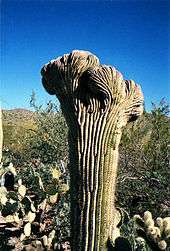
| Saguaro | |
|---|---|
.jpg) | |
| Scientific classification | |
| Kingdom: | Plantae |
| Clade: | Tracheophytes |
| Clade: | Angiosperms |
| Clade: | Eudicots |
| Order: | Caryophyllales |
| Family: | Cactaceae |
| Subfamily: | Cactoideae |
| Tribe: | Echinocereeae |
| Genus: | Carnegiea Britton & Rose |
| Species: | C. gigantea |
| Binomial name | |
| Carnegiea gigantea (Engelm.) Britton & Rose | |
 | |
| Natural range of Carnegiea gigantea | |
| Synonyms[2] | |
| |
Saguaros have a relatively long lifespan, often exceeding 150 years. They may grow their first side arm any time from 75–100 years of age, but some never grow any arms. Arms are developed to increase the plant's reproductive capacity, as more apices led to more flowers and fruit.
A saguaro can absorb and store considerable amounts of rainwater, visibly expanding in the process, while slowly using the stored water as needed. This characteristic enables the saguaro to survive during periods of drought. The saguaro cactus is a common image in Mexican culture and American Southwest films.
Description
The saguaro is a columnar cactus that grows notable branches, usually referred to as arms. As many as 49 arms may grow on one plant. They grow from 3–16 m (9.8–52.5 ft) tall, and up to 75 cm (30 in) in diameter. They are slow growing but routinely live to 150 or 200 years old. They are the largest cactus in the United States.[3][4]
The growth rate of saguaros is strongly dependent on precipitation; saguaros in drier western Arizona grow only half as fast as those in and around Tucson. Saguaros grow slowly from seed, and may only be 0.25 in (0.64 cm) tall after 2 years.[3]. Cuttings rarely root and when they do, they do not go through the juvenile growth phase which gives a different appearance.[5] Since 2014, the National Register of Champion Trees listed the largest known living saguaro in the United States in Maricopa County, Arizona, measuring 45.3 feet (13.8 metres) high with a girth of 10 feet (3.1 metres); it has an estimated age of 200 years and survived damage in the 2005 Cave Creek Complex Fire.[6][7] The tallest saguaro ever measured was an armless specimen found near Cave Creek, Arizona. It was 78 feet (23.8 metres) in height before it was toppled in 1986 by a windstorm.[8] They are stem succulents and can hold large amounts of water; when rain is plentiful and the saguaro is fully hydrated it can weigh between 3,200–4,800 pounds (1,500–2,200 kg).[4][3]
Saguaros have a very large root network that can extend up to 30 m (98 ft), and long taproots of up to 1 m (3.3 ft) deep.[3]
Saguaros may take between 20 and 50 years to reach a height of 1 m (3.3 ft).[3]
As a cactus, it uses crassulacean acid metabolism photosynthesis, which confers high levels of water-use efficiency. This allows the saguaro to only transpire at night, minimizing day-time water loss.[9]
A saguaro without arms is called a spear.[10]
Some saguaros grow in rare formations called a cristate, or "crested" saguaro. This growth formation is believed to be found in about 1 in every 10,000 saguaros, with 2743 known crested saguaros documented.[11] The crest formation, caused by fasciation, creates a seam of abnormal growth along the top or top of the arm of the saguaro.[12]
Ribs
Inside the saguaro, there are many "ribs" of wood that form something like a skeleton, with the individual ribs being as long as the cactus itself and up to a few inches in diameter. The rib wood itself is also relatively dense, with dry ribs having a solid density of approximately 430 kg/m3, which made the ribs useful to indigenous peoples as a building material. While the ribs of dead plants are not protected by the Arizona native plant law, the Arizona Department of Agriculture has released a memo discussing when it's necessary to obtain written permission before harvesting them because of the importance the decomposition of cactus remains in maintaining desert soil fertility.[13]
The composition of the ribs is similar to that of hardwoods.[14]:326
Spines
.jpg)
The spines on a saguaro are extremely sharp and can grow up to 1 millimetre (0.039 in) per day. When held up to the light or bisected, alternating light and dark bands transverse to the long axis of spines are visible. These transverse bands have been correlated to daily growth. In columnar cacti, spines almost always grow in areoles that originate at the apex of the plant. A spine stops growing in its first season. Areoles are moved to the side and the apex continues to grow upward. Thus, older spines are toward the base of a columnar cactus and newer spines are near the apex. Studies are underway to examine the relationship of carbon and oxygen isotope ratios in the tissues of spines of an individual to its climate and photosynthetic history (acanthochronology).[15]
Spines grow to 7 cm (2.8 in) long.[3]
The spines may cause significant injury to animals; one paper reported that a bighorn sheep skull had been penetrated by a saguaro spine after the sheep collided with a saguaro.[16] They can also cause severe injury to humans, being as sharp and nearly as strong as steel needles. Their long, non-barbed nature, means that partially embedded spines can be easily removed, but their relative length can complicate injuries. The spines can puncture deeply, and if broken off, leaving splinters of spine deep in the tissue, which can be difficult to remove. Fully embedded spikes are also difficult to remove. Such injuries do not usually result in infection however, as the cactus spines are generally aseptic. However, spines that remain embedded may cause inflammatory granuloma.[17]
Flowers
_blossoms.jpg)
The white, waxy flowers appear in April through June, opening well after sunset and closing in mid-afternoon. They continue to produce nectar after sunrise.[18] Flowers are self-incompatible, thus requiring cross-pollination.[3] Large quantities of pollen are required for complete pollination because many ovules are present. This pollen is produced by the extremely numerous stamens, which in one notable case totaled 3,482 in a single flower.[19] A well-pollinated fruit contains several thousand tiny seeds.[18]
Pollination is considered relatively generalized in that multiple species can produce effective pollination when some populations are excluded. Main pollinators are honey bees, bats, and white-winged doves. In most, but not all studies, diurnal pollinators contributed more than nocturnal ones. Honey bees were the greatest contributors. Other diurnal pollinators are birds such as Costa's hummingbird, the black-chinned hummingbird, the broad-billed hummingbird, the hooded oriole, Scott's oriole, the Gila woodpecker, the gilded flicker, the verdin, and the house finch. In studies, that examined the relative contributions of pollinators diurnal populations [18]
The primary nocturnal pollinator is the lesser long-nosed bat, feeding on the nectar. A number of floral characteristics are geared toward bat pollination (chiropterophily): nocturnal opening of the flowers, nocturnal maturation of pollen, very rich nectar, position high above ground, durable blooms that can withstand a bat's weight, and fragrance emitted at night. Claw marks on the flower indicate pollination by a bat.[20]
Flowers grow 3.4–4.9 in (8.6–12.4 cm) long, and are open for less than 24 hours. Since they form only at the top of the plant and the tips of branches, it is reproductively advantageous for saguaros to grow numerous branches. Flowers open sequentially, with plants averaging four open flowers a day over a bloom period lasting a month.[3] A decline in bat populations causes more daytime flower opening which favors other pollinators.[21]
Fruit

The ruby red fruits are 2.4 to 3.5 inches (6 to 9 cm) long and ripen in June, each containing around 2,000 seeds, plus sweet, fleshy connective tissue.[4][22]
The fruits are often out of reach and are harvested using a pole (made of 2 to 3 saguaro ribs) 15 to 30 feet (4.5 to 9 m) long, to the end of which cross-pieces, which can be made of saguaro rib, catclaw, or creosote bush, are attached. This pole is used to hook the fruits or knock them free.[23]
Saguaro seeds are small and short-lived. Although they germinate easily, predation and lack of moisture prevent all but about 1% of seeds from successful germination. Seeds must wait 12–14 months before germination; lack of water during this period drastically reduces seedling survival. The existence of nurse plants is critical to seedling establishment.[3] Palo verde trees and triangle bursage represent important nurse species. They act by regulating temperature extremes, increasing soil nutrients, and reducing evapotranspiration, among others. While nurse plants reduce summer temperature maximums by as much as 18 °C (32 °F), they are more important in raising winter minimum temperatures – as extended frosts limit the range of saguaros.[24]
Genome
The saguaro genome is around 1 billion base pairs long.[25] Sequencing has revealed that the genome of the saguaro's chloroplast is the smallest known among non-parasitic flowering plants. Like several other highly specialized plant taxa, such as the carnivorous Genlisea and parasitic Cuscuta, the Saguaro has lost the ndh plastid gene, which codes for production of NADPH dehydrogenase pathway. But unlike those taxa, the saguaro remains fully autotrophic; i.e. it does not eat or steal part of its food. The saguaro is remarkable for the scale and completeness of gene loss: essentially no traces of the 11 ndh genes remain in the plastid. The genes appear to have been copied to the nuclear DNA and mitochondrial DNA, but those copies are non-functional. How the saguaro thrives in a high stress environment without working copies of this fairly important gene remains unknown, but it is possible that the functions of the ndh genes have been taken on by another pathway.[26]
Taxonomy
The saguaro is the only species in the monotypic genus Carnegiea.[3] The first description of the saguaro was made by William H. Emory in 1848, during his surveys along the pre-Gadsden Purchase United States-Mexican border.[27] This description allowed cactus expert George Engelmann to formally name it, during his work on the United States and Mexican Boundary Survey, published in 1859.[28] The next major taxonomic treatment came from The Cactaceae, the seminal work on cactus by Nathaniel Lord Britton and Joseph Nelson Rose.
What tribe the saguaro belongs to is a matter of taxonomic dispute. A molecular analysis of the cactus family in 2010 placed the saguaro in the Echinocereinae.[29] The ARS GRIN places it in the Echinocereeae.[30]
The common name is a Spanish adaptation of a Tohono Oʼodham word.[31] The scientific genus name honors businessman and philanthropist Andrew Carnegie.[32] The specific epithet gigantea refers to its formidable size.[33]
Distribution and habitat
Saguaros are endemic to the Sonoran Desert and are found only in western Sonora in Mexico and in southern Arizona in the US – although plants are occasionally found in southeastern California. Elevation is a limiting factor to its environment, as the saguaro is sensitive to extended frost or cold temperatures.[4] No wild saguaros are found anywhere in New Mexico, Texas, Colorado, Utah, or Nevada, nor in the high deserts of northern Arizona.[34] The northern limits of their range are the Hualapai Mountains in Arizona.[3] They are the northernmost columnar cacti in the Americas.[14]:320
Ecology
The saguaro is a keystone species, and provides food, shelter, protection to hundreds of other species. Every stage of the saguaro's life sustains a significant number of species, from seedling to after its death.[35]
As food
The saguaro provides voluminous amounts of pollen, nectar, and fruits.[35] The fruits are eaten by the white-winged dove and ants, so that seeds rarely escape to germinate.[36] White winged doves are important pollinators, visiting blooms more often than any other bird species. For desert white winged doves, 60% or more of the diet is saguaro based. Their breeding cycle coincides with that of the sagauro blooming.[37]
Nests
Gila woodpeckers and gilded flickers create holes in the cactus to make nests, which are later used by other birds, such as the elf owl, purple martins and house finches.[38][39][40][41][42] Flickers excavate larger holes higher on the stem compared to Gila woodpeckers. The resulting nest cavity is deep, and the parents and young are entirely hidden from view. The saguaro creates callus tissue on the wound. When the saguaro dies and its soft flesh rots, the callus remains as a so-called saguaro boot, which was used by natives for storage.[36]
Gila woodpeckers (Melanerpes uropygialis) create new nest holes each season rather than reuse the old ones, leaving convenient nest holes for other birds, such as elf owls, tyrant flycatchers, and wrens.[43] In recent years, early breeding, aggressive, non-native birds have taken over the nests to the detriment of elf owls that breed and nest later. In 2020, a bald eagle was found nesting in a saguaro for the first time since 1937.[44][45]
Conservation
Harming or vandalizing a saguaro in any manner, such as shooting them (sometimes known as "cactus plugging")[46] is illegal by state law in Arizona. When houses or highways are built, special permits must be obtained to move or destroy any saguaro affected.[47] Exceptions to this general understanding exist; for example, a private landowner whose property is 10 acres (4.0 ha) or less, where the initial construction has already occurred, may remove a saguaro from the property.[48] This is common when the cactus falls over in a storm, its location interferes with a house addition, or it becomes a potential hazard to humans.[49]
In 1982, a man was killed after damaging a saguaro. David Grundman was shooting and poking at a saguaro cactus in an effort to make it fall. An arm of the cactus, weighing 500 pounds (230 kg) fell onto him, crushing him and his car. The trunk of the cactus then also fell on him.[46][50] The Austin Lounge Lizards wrote the song "Saguaro" about this death.[50]
Contrary to published statements,[51] there is no law mandating prison sentences of 25 years for cutting a cactus down; however it is considered a class-4 felony with a possible 3-year, 9-month maximum sentence.[52]
Invasive species, such as buffelgrass and Sahara mustard, pose significant threats to the Sonoran Desert ecosystem by increasing the rate of fires.[53] Buffelgrass outcompetes saguaros for water, and grows densely. It is also extremely flammable, but survives fire easily thanks to deep root systems.[54] Saguaros did not evolve in an environment with frequent fires, and are thus not adapted to fire survival. Most Sonoran desert ecosystems have a fire return interval of greater than 250 years; buffelgrass thrives at fire return intervals of two to three years. This has led to the reshaping of the Sonoran Desert ecosystem and threatens the survival of the saguaro.[55]
Climate change will threaten saguaros and their ecosystems, as deserts are particularly susceptible to climate effects. Rising daytime and nighttime temperatures will reduce the water use efficiency of saguaros, forcing them to use more water and making them more likely to die during drought periods.[9]
Uses
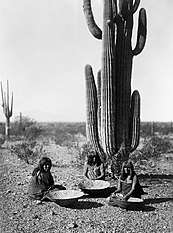
Ethnobotany
The utility of the saguaro was well known to Native Americans such as the Tohono Oʼodham, Pima and Seri peoples, who still use nearly every part of the plant.[14][56] The fruit and seeds are edible,[36] being consumed fresh and dried, and made it into preserves and drinks.[38] The Tohono O'odham use long sticks to harvest the fruits, which are then made into a variety of products including jams, syrups, wine.[33] The Tohono O'odham begin their harvest in June. A pair of saguaro ribs, about 6.1 m (20 ft) long, are bundled together to make a harvesting tool called a kuibit. The Tohono O'odham traditionally reduces the freshly harvested fruit into a thick syrup through several hours of boiling, as the fresh fruit does not keep for long. 4 kg (8.8 lb) of fruit will yield about 1 L (0.26 U.S. gal) of syrup. Copious volumes of fruit are harvested; an example harvest in 1929 yielded 45,000 kg (99,000 lb) among 600 families.[14]:324-326
The seeds are ground into meal or eaten raw; however, the raw seeds are mostly undigestable. They are also pressed for their oils. They also have minor use in the tanning of leather. In modern times, these uses have declined, and the seeds are now mainly used as chicken feed.[14]:324
The ribs of the dead saguaro were used for construction and other purposes by Native Americans.[4] The Tohono O'odham uses it for making fences and furniture. The ribs are also used as livestock fodder.[33]
A variety of alkaloids, including carnegine, gigantine, and salsolidine make the stems quite bitter, and an unpalatable way to gain water.[14]:323
Reports of saguaro use date back to the Coronado expeditions of 1540–1542, which noted its use in winemaking.[14]:324
The old bird nests resist the elements and are gathered by Native Americans for use as storage vessels.[36] Cactus boots, excavated by birds and taken from dead saguaros, have been used by native peoples as water containers.[4]
The Saguaro features prominently in indigenous folklore and religions.[14]:320
Culture
Arizona made the saguaro blossom its territorial flower on March 13, 1901, and on March 16, 1931, it became the state flower.[57]
The saguaro is often used as an emblem in commercials and logos that attempt to convey a sense of the Southwest, even if the product has no connection to Arizona or the Sonoran Desert. For instance, no naturally occurring saguaros are found within 250 miles (400 km) of El Paso, Texas, but the silhouette is found on the label of Old El Paso brand products.[58][34] Though the geographic anomaly has lessened in recent years, Western films once enthusiastically placed saguaros in the Monument Valley of Arizona, as well as New Mexico, Utah, and Texas. The Dallas, Texas-based band Reverend Horton Heat pokes fun at this phenomenon in their song "Ain't no Saguaro in Texas".[59]
An Austin Lounge Lizards song, "Saguaro", is based on the true story of David Grundman, who died from shooting a cactus.[60]
Gallery
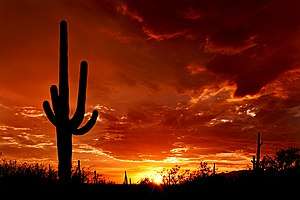 Silhouette at sunset
Silhouette at sunset Saguaro towering over a 6-ft man
Saguaro towering over a 6-ft man Mature five-armed in flower
Mature five-armed in flower Snow-covered saguaro near Tucson. Saguaros can survive a few hours of below-freezing temperatures.
Snow-covered saguaro near Tucson. Saguaros can survive a few hours of below-freezing temperatures.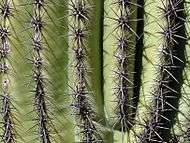 Needles, Paradise Valley, Arizona
Needles, Paradise Valley, Arizona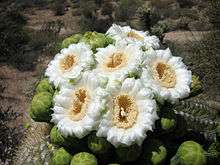 Flowers, Scottsdale, Arizona
Flowers, Scottsdale, Arizona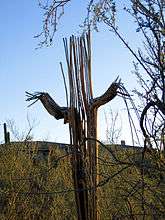 The bare wooden ribs of a dead saguaro
The bare wooden ribs of a dead saguaro- Unusually-formed crested or cristate saguaro near Kino Bay, Sonora
References
Notes
- "The IUCN Red List of Threatened Species". IUCN Red List of Threatened Species. Retrieved 2018-10-26.
- "Carnegiea gigantea (Engelm.) Britton & Rose". Tropicos. Missouri Botanical Garden. Retrieved 2014-09-19.
- Pavek, Diane S. (1993). "Carnegiea gigantea". US Forest Service Fire Effects Information System. U.S. Department of Agriculture, US Forest Service, Rocky Mountain Research Station, Fire Sciences Laboratory (Producer). Retrieved 2019-10-02.
- "Saguaro Cactus Fact Sheet". www.desertmuseum.org. Retrieved 2019-03-27.
- Arizona-Sonora Desert Museum Staff (2000). A Natural History of the Sonoran Desert: Revised and Updated Edition. University of California Press. p. 193. ISBN 978-0-520-21980-9.
- Brean, Henry (September 22, 2019), "Tree hunters stalk giants for Arizona's growing list of champions", tucson.com, retrieved 2020-01-30
- Muller, Seth (January 13, 2014), "Natural Selections: Searching out the saguaro", Arizona Daily Sun, retrieved 2020-01-30
- "Windstorm Fells 78-Foot Cactus--Tallest in World". Retrieved 2015-08-04.
- Bronson, Dustin R.; English, Nathan B.; Dettman, David L.; Williams, David G. (2011-08-06). "Seasonal photosynthetic gas exchange and water-use efficiency in a constitutive CAM plant, the giant saguaro cactus (Carnegiea gigantea)". Oecologia. 167 (3): 861–71. Bibcode:2011Oecol.167..861B. doi:10.1007/s00442-011-2021-1. ISSN 1432-1939. PMID 21822726.
- Krieg, John C. (December 20, 2018). Desert Landscape Architecture. CRC Press. p. 466. ISBN 978-1-351-45610-4.
- "Joe Orman's Photo Pages - Crested Saguaros". joeorman.shutterace.com. Retrieved 2020-02-29.
- "Crested Cactus". www.crestedsaguarosociety.org. Retrieved 2020-02-29.
- "Arizona Dept. of Agriculture memo on harvesting Saguaro ribs" (PDF). Retrieved 4 November 2019.
- Bruhn, Jan G. (1971). "Carnegiea gigantea: The Saguaro and Its Uses". Economic Botany. 25 (3): 320–329. doi:10.1007/BF02860768. ISSN 0013-0001. JSTOR 4253267.
- English, N. B.; Dettman, D. L.; Sandquist, D. R.; Williams, D. G. (2007). "Past climate changes and ecophysiological responses recorded in the isotope ratios of saguaro cactus spines". Oecologia. 154 (2): 247–58. Bibcode:2007Oecol.154..247E. doi:10.1007/s00442-007-0832-x. PMID 17724618.
- Jansen, Brian D.; Krausman, Paul R.; Heffelfinger, James R.; Jr, James C. deVos (24 March 2005). "Saguaro Spine Penetrated Bighorn Sheep Skull". The Southwestern Naturalist. 50 (4): 513–515. doi:10.1894/0038-4909(2005)050[0513:SSPBSS]2.0.CO;2. ISSN 0038-4909.
- Lindsey, Douglas; Lindsey, Wally E. (1988-07-01). "Cactus spine injuries". The American Journal of Emergency Medicine. 6 (4): 362–369. doi:10.1016/0735-6757(88)90158-1. ISSN 0735-6757. PMID 3390256.
- Fleming, Theodore H.; Sahley, Catherine T.; Holland, J. Nathaniel; Nason, John D.; Hamrick, J. L. (2001). "Sonoran Desert Columnar Cacti and the Evolution of Generalized Pollination Systems". Ecological Monographs. 71 (4): 511. doi:10.1890/0012-9615(2001)071[0511:SDCCAT]2.0.CO;2. ISSN 0012-9615.
- SCIENCE Vol. 40 (November 6, 1914) p. 680.
- Abrol, Dharam P. (October 5, 2011). Pollination Biology: Biodiversity Conservation and Agricultural Production. Springer Science & Business Media. p. 294. ISBN 978-94-007-1942-2.
- Fleming TH, Geiselman C, Kress WJ (2009). "The evolution of bat pollination: a phylogenetic perspective". Ann Bot. 104 (6): 1017–43. doi:10.1093/aob/mcp197. PMC 2766192. PMID 19789175.CS1 maint: multiple names: authors list (link)
- Nabhan, Gary Paul (2004). Conserving Migratory Pollinators and Nectar Corridors in Western North America. University of Arizona Press. p. 124. ISBN 978-0-8165-2254-5.
- "Saguaro Fruit: A Traditional Harvest" (PDF). nps.gov. National Park Service. Retrieved 21 December 2019.
- Drezner, Taly D.; Garrity, Colleen M. (2003-11-01). "Saguaro Distribution under Nurse Plants in Arizona's Sonoran Desert: Directional and Microclimate Influences". The Professional Geographer. 55 (4): 505–512. doi:10.1111/0033-0124.5504008. ISSN 0033-0124.
- "SGP5_Cgig_v1.3 - Genome - Assembly - NCBI". www.ncbi.nlm.nih.gov. Retrieved 24 April 2018.
- Sanderson, Michael J.; Copetti, Dario; Búrquez, Alberto; Bustamante, Enriquena; Charboneau, Joseph L. M.; Eguiarte, Luis E.; Kumar, Sudhir; Lee, Hyun Oh; Lee, Junki (2015-07-01). "Exceptional reduction of the plastid genome of saguaro cactus (Carnegiea gigantea): Loss of the ndh gene suite and inverted repeat". American Journal of Botany. 102 (7): 1115–1127. doi:10.3732/ajb.1500184. ISSN 0002-9122. PMID 26199368.
- Spence, Mary Lee (1984). The Expeditions of John Charles Fremont, vol 3, Travels from 1848 to 1854. Urbana, Illinois: University of Illinois Press. pp. 495–496. ISBN 978-0-252-00416-2.
- "George Engelmann - Scientist of the Day". Linda Hall Library. 2017-02-02. Retrieved 2019-11-04.
- Nyffeler, R.; Eggli, U. (2010). "A farewell to dated ideas and concepts: molecular phylogenetics and a revised suprageneric classification of the family Cactaceae". Schumannia. 6: 109–149. doi:10.5167/uzh-43285. ISSN 1437-2517.
- "Taxonomy - GRIN-Global Web v 1.10.5.0". npgsweb.ars-grin.gov. Retrieved 2019-11-04.
- Klingaman, Gerald (December 12, 2008). "Plant of the week: Saguaro Cactus". University of Arkansas Cooperative Extension. Retrieved 2019-12-17.
- Schlosser, S. E. "Saguaro cactus: 8 things you might not know". azcentral. Retrieved 2019-12-17.
- Buckley, Steve (2011) [First published 2009]. Common Plants of Saguaro National Park (PDF). National Parks Service; Sonoran Desert Network. p. 63.
- "Where Saguaros Grow - Saguaro National Park (U.S. National Park Service)". www.nps.gov. Retrieved 24 April 2018.
- Drezner, Taly Dawn (2014-06-01). "The keystone saguaro (Carnegiea gigantea, Cactaceae): a review of its ecology, associations, reproduction, limits, and demographics". Plant Ecology. 215 (6): 581–595. doi:10.1007/s11258-014-0326-y. ISSN 1573-5052.
- Peattie, Donald Culross (1953). A Natural History of Western Trees. New York: Bonanza Books. pp. 647, 649.
- Rabe, Michael J. (June 2009). Sanders, Todd A. (ed.). "Mourning Dove, White-winged Dove, and Band-tailed Pigeon: 2009 population status" (PDF). Laurel, Maryland: United States Fish and Wildlife Service. pp. 25–32.

- Little, Elbert L. (1994) [1980]. The Audubon Society Field Guide to North American Trees: Western Region (Chanticleer Press ed.). Knopf. p. 562. ISBN 0394507614.
- Mark Elbroch; Eleanor Marie Marks; C. Diane Boretos (2001). Bird tracks and sign. Stackpole Books. p. 311. ISBN 0-8117-2696-7.
Cavities in saguaro cactuses in the Southwest are common. Both gilded flickers and Gila woodpeckers make these cavities for nesting, but they often choose different locations on the cactus.
- "Gila Woodpecker". Nature Conservancy. Archived from the original on 2016-12-15. Retrieved 2011-10-28.
Although they do not use them immediately, waiting first for the sap to harden, Gila Woodpeckers excavate cavities in cacti and trees as nesting sites.
- Mark Elbroch; Eleanor Marie Marks; C. Diane Boretos (2001). Bird tracks and sign. Stackpole Books. p. 311. ISBN 0-8117-2696-7.
Cavities in saguaro cactuses in the Southwest are common. Both gilded flickers and Gila woodpeckers make these cavities for nesting, but they often choose different locations on the cactus. The stouter bills of the gilded flickers allow them to cut cavities through the wooden ribs near the top of the cactus where the ribs converge. Gila woodpeckers stay at midlevel on the cactus where the ribs are separated enough to cut a cavity between them. Cavities in saguaros are cut out by these birds the year before they are inhabited. The excavated cactus secretes a fluid that hardens into a scab, thus preventing water loss, which could kill the cactus, as well as waterproofing the inside of the nest cavity.
- "Gila Woodpecker Fact Sheet". www.desertmuseum.org. Retrieved 2019-02-22.
- "Gila woodpecker". Nature Conservancy. Retrieved 2011-01-24.
Although they do not use them immediately, waiting first for the sap to harden, Gila woodpeckers excavate cavities in cacti and trees as nesting sites. Females typically lay two broods a year of three to five eggs, which incubate for 14 days. Once abandoned, the cavities are occupied by reptiles, rodents, and small birds like kestrels, elf owls, flycatchers, and wrens. In the desert, the woodpeckers perform the important ecological function of removing unhealthy flesh from the saguaro cactus. Some insects on which it feeds carry diseases, harmless to the bird, which damages the cactus and leaves discolorations. The marks signal larvae to the bird, and as it excavates the insects, it also cuts away the diseased tissue. As the sap hardens, the cactus is healed, and the excavation becomes a convenient nesting site.
- "AZGFD spots first documented bald eagle nest in saguaro". KGUN. 2020-04-16. Retrieved 2020-04-16.
- Press, The Associated (2020-04-16). "Bald Eagles, Eaglets Found Nesting in Arms of Arizona Cactus". The New York Times. ISSN 0362-4331. Retrieved 2020-04-16.
- Klingaman, Gerald (December 12, 2008), Plant of the Week: Saguaro Cactus, University of Arkansas, archived from the original on April 5, 2013, retrieved 2013-02-13.
- "Article 11: Arizona Native Plants". Arizona Department of Agriculture. Archived from the original on September 20, 2013.
- "Private Landowners Clearing Protected Native Plants" (PDF). Arizona Department of Agriculture. Archived from the original (PDF) on September 20, 2013.
- "Arizona Revised Statutes, A.R.S. 3-904.(H): Destruction of protected plants by private landowners; notice; exception". Arizona State Legislature.
- Mikkelson, David (February 8, 2015), Death by Saguaro, Snopes, retrieved 2017-01-20
- Trimble, Marshall (2012). "Only On Hold Strange Laws Still On The Books In Arizona". Tucson News Now. Hold. Retrieved July 2, 2017.
- Snyder, Stephanie (2010). "Safety of native plants protected under Arizona law". ASU.edu. Chevas Samuels, McKenzie Manning, Stephanie Snyder. Retrieved July 2, 2017.
“While damaging a cactus in Arizona will not warrant the rumored possibility of 25 years in prison, it is still considered a class four felony.”
- Schiermeier, Quirin (2005-06-01). "Pall hangs over desert's future as alien weeds fuel wildfires". Nature. 435 (7043): 724. Bibcode:2005Natur.435..724S. doi:10.1038/435724b. ISSN 1476-4687. PMID 15944662.
- Marshall, V. M.; Lewis, M. M.; Ostendorf, B. (2012-03-01). "Buffel grass (Cenchrus ciliaris) as an invader and threat to biodiversity in arid environments: A review". Journal of Arid Environments. 78: 1–12. Bibcode:2012JArEn..78....1M. doi:10.1016/j.jaridenv.2011.11.005. ISSN 0140-1963.
- Hauser, A. Scott (1993). "Pennisetum ciliare". US Forest Service Fire Effects Information System. U.S. Department of Agriculture, US Forest Service, Rocky Mountain Research Station, Fire Sciences Laboratory (Producer). Retrieved 2019-10-02.
- A Natural History of the Sonoran Desert, Edited by Steven J Phillips and Patricia Comus, University of California Press, Berkeley, 2000, p. 193
- Arizona blue book, Janice K. Brewer, 2003–2004, retrieved 2020-01-31CS1 maint: date format (link)
- Inc., General Mills. "Cooking Ideas from Old El Paso". www.oldelpaso.com. Retrieved 24 April 2018.
- Courtney, David (January 2019), "The Texanist: There Ain't No Saguaro Cactus in Texas. Got It?", Texas Monthly, retrieved 2020-01-31
- Brunvand, Jan Harold (17 August 1990). Curses! Broiled Again!. W. W. Norton. pp. 44–46. ISBN 978-0-393-30711-5.
Bibliography
- Benson, L. (1981). The Cacti of Arizona. University of Arizona Press. ISBN 0-8165-0509-8.
- Drezner TD (2005) Saguaro (Carnegiea gigantea, Cactaceae) growth rate over its American range and the link to summer precipitation. Southwest Nat 50:65–68.
- Felger, Richard; Mary B. Moser. (1985). People of the desert and sea: ethnobotany of the Seri Indians. Tucson: University of Arizona Press.
External links
| Wikimedia Commons has media related to Carnegiea. |
| Look up saguaro in Wiktionary, the free dictionary. |
